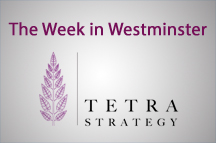 The razzmatazz of previous Autumn Statements has gone. Next year the Autumn Statement itself will be gone. The high-vis, hard hat photo opportunities favoured by the Chancellor’s predecessor has given way to spreadsheets and a soberness of delivery.
The razzmatazz of previous Autumn Statements has gone. Next year the Autumn Statement itself will be gone. The high-vis, hard hat photo opportunities favoured by the Chancellor’s predecessor has given way to spreadsheets and a soberness of delivery.
It was a difficult balancing act for our new Chancellor. He couldn't deliver a gloomy statement for fear of the wrath of the Brexiteers, yet he was going to have to admit that growth forecasts have been cut, that debt will reach 90% of GDP and that the UK will still be running a £20billion budget deficit well into the next Parliament.
However, for seasoned watchers of the Treasury something else caught the eye this week as well. Out went the confetti-like spread of departmental announcements designed to please backbenchers and confuse the number crunchers. In came an era of Cabinet colleagues being allowed to make their own announcements. In consequence, there was a lot expected around the Autumn Statement that was notable by its absence. The tidal lagoon review, Industrial Strategy Green Paper, corporate governance reform proposals, new nuclear roadmap, next steps for aviation, powers for northern transport – announcements that would have been trumpeted by previous Chancellors gifted instead to cabinet colleagues.
For those engaging with government it means a slightly different approach is needed. The creation of a powerful industrial department to offset the power of the Treasury has been talked about by politicians for generations. Infrastructure is certainly a priority for this government, even if delivery (read: affordable housing) can't keep up with the rhetoric. That means that the new BEIS department, Department for Transport, and department for Communities and Local Government are more important in this new world. New beginnings, or, in the current lingo, signs that departments aren’t ‘match fit’? At the very least the power dynamic between Prime Minister and Chancellor is different. May/Hammond does not invoke the same reaction as, say, Blair/Brown or Cameron/Osborne.
 Campaigners, business groups, unions and charities need to spread themselves across government and follow the development of policy through Whitehall (and its devolved equivalents) – but that does not mean the power of the Treasury is over. Far from it. The resolve of the Government to drive up productivity and bolster growth in the face of (a chaotic) Brexit means the Treasury is still central to policy.
Campaigners, business groups, unions and charities need to spread themselves across government and follow the development of policy through Whitehall (and its devolved equivalents) – but that does not mean the power of the Treasury is over. Far from it. The resolve of the Government to drive up productivity and bolster growth in the face of (a chaotic) Brexit means the Treasury is still central to policy.
So how did our beady Chancellor respond to these challenges?
Well there was a sober recognition of the strength and weaknesses of the UK economy. There was more money for housing, roads and broadband - but nothing extra for health and social care which could leave the Government exposed over a difficult winter. There was an increase in the minimum wage, the tax free allowance and a more generously tapered universal credit but a crackdown on perks which attract tax exemptions to help pay for it. Steady stuff from the nation’s accountant-in-chief.
Buried deep in a few throw-away statements was a heads up on austerity for the next Parliament with a threatened review of the largesse of the triple lock on pensions and the ring fencing of NHS spending - two great shibboleths of this Parliament. It could not have pleased Downing Street that two such controversial policies will now be up for grabs but they did represent two key planks of credibility for the Chancellor who wants to reassure the markets that 'spreadsheet Phil' really is determined to make the numbers add up...in the end.












